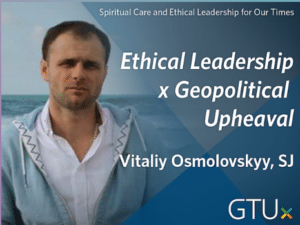At the time the war began I was studying at the Jesuit School of Theology in Berkeley. The array of emotions that overcame me when I first learned about the attack are not easy to describe. When my city was bombed and shelled and I was saying goodbye to my parents and friends over the phone, was a very intense moment. It was then when one thing was clear: I had to control my emotions and feelings regarding myself in order to be able to help. I had to plan rationally how to work. I understood that sometimes we must make good out of evil because there is nothing else to make of it. Two days later, the Jesuit headquarters in Rome appointed me to coordinate the Jesuit humanitarian mission (help) for Ukraine in Poland. At that moment, I remembered the words from the book “Just Mercy,” where Bryan Stevenson quotes his grandmother as telling him: “You can’t understand most of the important things from a distance. You have to get close.” I had to leave behind my studies and my life in the USA and move back to Europe. I began coordinating our mission and helping organize the Jesuit Refugee Service (JRS) structure.
In our daily life, there is always the possibility that something could happen to us and we could lose our life. We generally do not think of those moments unless confronted directly with them. In such moments, one person showing us mercy or love can transform this terrible situation into something tolerable. Love, the most sacred thing in a person and the world, is under attack as the chance for life is snatched away. I think that when love disappears, God also disappears for a person of faith and ethical leadership. Therefore, one of our tasks (as human beings and leaders) is to support and find in every person, without exception, the light of hope, the light of Easter, and the light of peace. It is challenging, and indeed, there is no desire when anger overwhelms us. It is tough when your neighbor wants to behead love, strength, and freedom. It is good when our care and love do not allow us to remain in our loneliness, grief, or tragedy. However, we are just human beings, and we all have moments of weakness.
One of the most challenging moments during this war have been seeing the many farewells. When a husband and father drop off his wife and children at the border and has to say goodbye; when these men, women, and children have an honest and innocent look in their eyes filled with absolute love without knowing if this is a temporary or forever farewell which unfailingly is filled with hope. Just think about these words: forever, never, and never again will meet. These moments show us the sacred mystery of our humanity: an instant of departure filled with hope. The evangelist says God is love, although it is hard to see it in such moments, and the only tangible thing is destruction. One extraordinary grace is to believe and hope where there is no faith and hope. When we ask for the Holy Spirit’s power, we can receive the leader’s grace in such difficult moments and be able to lead by love. It is our choice to be a leader and fill ourselves with love. Our leadership is rooted in our sense of humanity and in love. We have to be more focused on what unites us rather than what divides us.
Renew our days, Lord!
What kind words!
Vitaliy Osmolovskyy SJ is a doctoral student at JST-SCU and coordinator of Jesuit Outreach to Ukrainian Refugees in Poland. You can watch his Spiritual Care and Ethical Leadership lecture “Ethical Leadership x Geopolitical Upheaval” on GTUx here.

